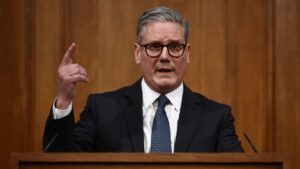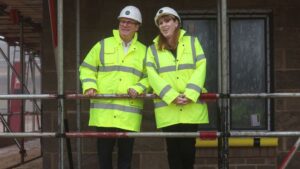Labour won’t want to be associated with austerity – but it’s creeping into the debate
The chancellor is already rolling the pitch for a painful budget, and the Conservative attack lines are starting to become familiar.

The government comfortably won another vote today but, while Starmer has the numbers behind him to withstand opposition – including from his own party – he is under pressure to change his gloomy tune.
As many as 52 Labour MPs refused to support the government’s plan to axe the winter fuel payment for all but the poorest pensioners, with one outright voting against the policy. It comes just months after the government won a vote to maintain the two-child benefit cap.
It’s understood that only 12 of those absences were unauthorised, with the government appearing sanguine about the result. Yet, there are more than a few murmurings of discontent.
Politics live: Candidate eliminated from race to replace Sunak
While the party was elected on a mandate to “change Britain” and “fix public services,” it’s increasingly being associated with phrases like “austerity” and “benefit cuts.”
Taking a leaf out of the coalition government’s 2010 playbook, the government is trying to shape a different narrative: that “difficult decisions” are the result of the previous government’s recklessness.
It’s not a straightforward sell. The arithmetic might back Sir Keir, but his message won’t necessarily wash with a weary public – or with MPs.
Many of them laid out their stalls ahead of the vote in a debate that featured a series of impassioned speeches.
The most notable came from Labour’s own MPs, with the likes of Rachael Maskell and Neil Duncan-Jordan calling for the policy to be delayed, signalling that they would rebel against their own party. Both abstained.

Keep up with all the latest news from the UK and around the world by following Sky News
Jon Trickett, the one Labour MP who outright voted against the policy, now awaits his fate. He will have seen how the leadership treated the seven MPs who rebelled against the party’s stance on the two-child benefit cap. They all lost the whip.
John McDonnell, among that camp of seven MPs, signalled that he would vote against the government again. He said: “I do regret voting for a motion put forth by [Tories], but I will have to because there’s no other mechanism. And I say to my people in back in Hayes: I want to look at them in their face and say, I did the right thing.”
He was joined by Zarah Sultana, Richard Burgon, Ian Byrne, and Apsana Begum. Their route back into the Labour Party now looks more uncertain. The remaining two, Rebecca Long-Bailey and Imran Hussain, abstained.
While the government comfortably won the vote, the narrative they have tried to cement since winning the election came under strain from opposition MPs. The government argues that the withdrawal of support to all pensioners is necessary to salvage the public finances and fix the economy.
It was a line repeated by Liz Kendall, the work and pensions secretary, who sounded a lot like the last Conservative chancellor Jeremy Hunt when she said: “We must fix the foundations of our economy” and “When money is tight” tough decisions have to be made.
Be the first to get Breaking News
Install the Sky News app for free


Read more:
State pension to rise by more than £400
Sign ups for pension credit doubles
Starmer: Cutting fuel payment will stabilise economy
In this battle of competing narratives, the notion was repeatedly challenged. The Tories accused the government of fabricating a fiscal black hole and unfairly blaming their predecessors for what is ultimately a political choice, rather than a necessity.
Austerity is not a word any Labour government wants to be associated with, yet it crept into today’s debate over the winter fuel allowance – a sign among many that the government’s efforts to pin the blame for its unpopular decisions onto the previous government aren’t working as well as it would like.
👉 Tap here to follow the Sky News Daily podcast – 20 minutes on the biggest stories every day 👈
Sir Edward Leigh described the government’s framing as “nonsense,” accusing the government of taking benefits away from people to pay train drivers – a reference to the public sector pay rises handed out by the chancellor to settle industrial action.
Mel Stride, the shadow work and pensions secretary, doubled down, saying that Labour was “run by the unions”.
With the chancellor already rolling the pitch for a painful budget, this is an attack line we can expect to hear repeatedly.


